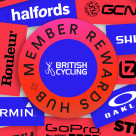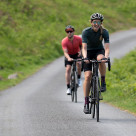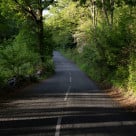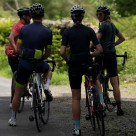Laura Kenny, Lizzie Deignan, Sir Chris Hoy, Elinor Barker and Joanna Rowsell Shand are just a few of the world and Olympic cycling champions to join a host of ‘real women’ in backing a long-standing campaign which aims to narrow the vast gender cycling gap and get one million more women on bikes by 2020.
Our latest research shows that two thirds of frequent cyclist in Britain are men (69%), compared to countries like Denmark where male cyclists account for 47% and female cyclists 53%.
There is also a vast disparity in confidence levels amongst women and men, with more than six in ten women (64%) saying they don’t feel confident riding their bike on the roads (26% higher than men) and a similar number claiming that infrastructure (63%) and driver behaviour (66%) does not make them feel safe (17% and 13% higher than men, respectively). If these barriers were removed, statistics indicate the true potential to grow women’s cycling - with 36% of women – equating to 9,720,000 - saying they would like to cycle more frequently.
In 2013 we launched our women’s strategy when just 525,000 women were cycling regularly - with the aim to boost this figure by 1 million, by 2020. The initiative, backed by Sport England’s This Girl Can campaign, has helped to inspire over 800,000 women to take up cycling to date, however despite this progress, the stubborn gender disparity and dwindling confidence levels indicate there is much more to be done.

The ‘One in a Million’ campaign aims to tackle perceptions which prevent everyday women from getting on a bike, including almost three quarters (72%) who say they feel there should be safer cycle routes and they have a lack of knowledge of where to go.
Julie Harrington, British Cycling Chief Executive, said: “Aside from reaching our million women target we want to create a cultural shift which normalises cycling for everyone – so that an equal number of women to men are riding bikes in this country.
“Cycling is increasingly being understood as a fundamental part of the solution when it comes to issues of public health and air quality however change will not come unless people feel safe on the roads and we know this disproportionately affects women.
“We want women to know that cycling is safe and there are plenty of easy and accessible options available for people wanting to get started. Our HSBC UK Breeze programme has helped to transform the lives of thousands of women who would never have considered cycling otherwise, however this alone isn’t enough. We need to work with other organisations to improve infrastructure, accessibility and break down the barriers to transform Britain into a great cycling nation.”
Indigo Kelly Forest, a teacher from Leicestershire, said: “I was a size 24 when I first got on a bike. I was dealing with grief after losing my mother and I decided, enough was enough. Despite feeling embarrassed to even be seen on a bike, I discovered my local breeze club and I’ve never looked back.
“Cycling helps me with all aspects of my life now, from my physical and mental wellbeing to pushing me on to achieve things I never thought I could. Before I started cycling I had a perception that it was unsafe, and that cycling wasn’t for me. But getting over that initial hunch was the best thing I ever did - it’s completely changed my life.”
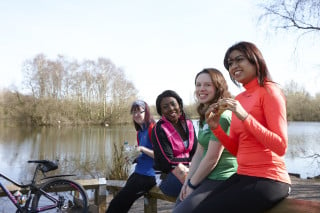
Olympic Champion Sir Chris Hoy, an ambassador for the campaign, said: “Cycling, in all its forms – whether it’s commuting, competing, coaching or as a career – must be just as appealing to women as it is to men. And it’s really important that everyone involved in cycling takes responsibility for this. These heightened negative perceptions of confidence and safety on a bike amongst women are concerning as this is worsening the cycling gender gap and preventing women from getting on bikes altogether.
“If we are to close this gap we need to redouble our efforts to encourage more women to consider cycling and show them that it is safe, you don’t have to be super fit or have a wardrobe full of lycra and there are women’s only Breeze rides across the whole of the country waiting to welcome beginners.
“Getting a million more women in the saddle will be a great feat but if we are to change the face of cycling in the UK we need to drive forward progress by creating additional opportunities and true gender parity for women in cycling at every level.”
Luke Harper, HSBC UK head of the partnership with British Cycling, said: “We are fully behind the One In A Million campaign. The impact of getting women back onto bikes shouldn’t be under-estimated and Breeze has been a breath of fresh air to cycling; a free guided ride, led by women for women. It is fantastic news that it has been embraced by so many and we look forward to many more taking up cycling through the One In A Million campaign.”
For more information and practical tips about how to take to two wheels visit our online women’s hub.


